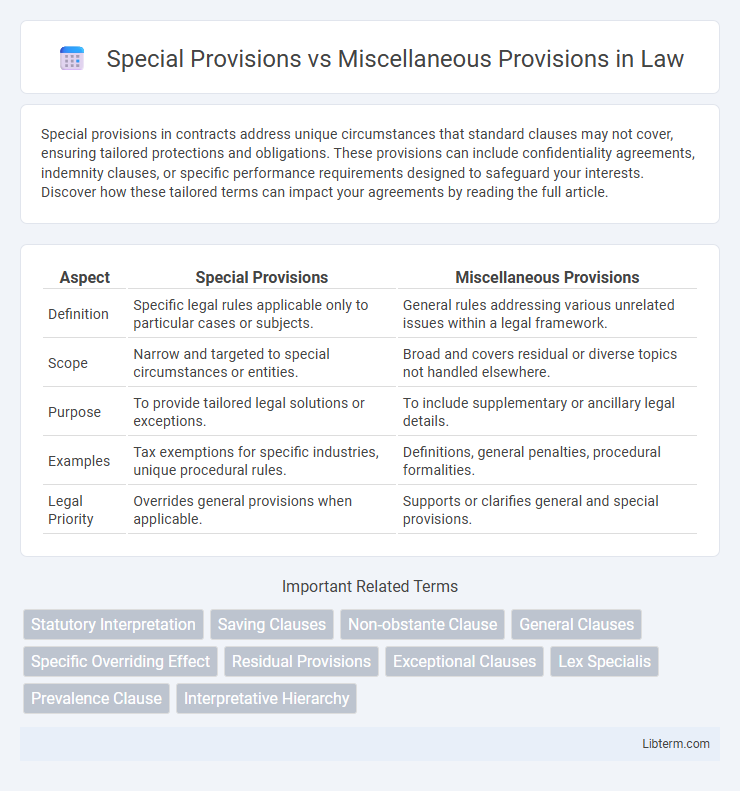Special provisions in contracts address unique circumstances that standard clauses may not cover, ensuring tailored protections and obligations. These provisions can include confidentiality agreements, indemnity clauses, or specific performance requirements designed to safeguard your interests. Discover how these tailored terms can impact your agreements by reading the full article.
Table of Comparison
| Aspect | Special Provisions | Miscellaneous Provisions |
|---|---|---|
| Definition | Specific legal rules applicable only to particular cases or subjects. | General rules addressing various unrelated issues within a legal framework. |
| Scope | Narrow and targeted to special circumstances or entities. | Broad and covers residual or diverse topics not handled elsewhere. |
| Purpose | To provide tailored legal solutions or exceptions. | To include supplementary or ancillary legal details. |
| Examples | Tax exemptions for specific industries, unique procedural rules. | Definitions, general penalties, procedural formalities. |
| Legal Priority | Overrides general provisions when applicable. | Supports or clarifies general and special provisions. |
Introduction to Special and Miscellaneous Provisions
Special Provisions refer to specific clauses or conditions tailored to particular contracts or legal contexts, ensuring that unique requirements and exceptions are clearly addressed. Miscellaneous Provisions encompass a broad range of standard terms that cover general aspects not specified elsewhere, often including definitions, notices, and general obligations. Understanding the distinction between these provisions is essential for accurately interpreting contract frameworks and ensuring comprehensive legal coverage.
Defining Special Provisions
Special Provisions are specific contractual terms tailored to address unique project requirements or risks, differing from standard contract clauses by providing precise instructions or conditions. These provisions override or supplement general contract terms to ensure clarity and compliance with project-specific demands in construction, legal, or business agreements. Miscellaneous Provisions, in contrast, encompass general clauses covering various administrative or procedural aspects not addressed elsewhere in the contract.
Understanding Miscellaneous Provisions
Miscellaneous provisions are a critical component of legal documents, encompassing various clauses that do not fit into the main sections but are essential for ensuring comprehensive interpretation and enforcement. These provisions often address issues like jurisdiction, severability, amendment procedures, and notice requirements, providing flexibility and clarity that support the overall contract framework. Understanding miscellaneous provisions helps prevent disputes by clarifying the operational mechanics and legal boundaries beyond the primary contractual obligations.
Key Differences Between Special and Miscellaneous Provisions
Special Provisions consist of detailed, tailored clauses addressing specific legal, contractual, or regulatory requirements unique to a particular agreement or context, ensuring precise compliance and risk management. Miscellaneous Provisions serve as catch-all sections covering general terms, such as notices, severability, and governing law, that do not fit neatly into other categories but are essential for the contract's overall functionality. The key difference lies in Special Provisions targeting particularized, substantive issues, while Miscellaneous Provisions handle broad, procedural, or auxiliary matters supporting the entire document.
Legal Significance of Special Provisions
Special Provisions hold critical legal significance by providing specific rules that override or supplement general laws within a legal framework, ensuring precise application in particular contexts such as contracts, statutes, or regulations. These provisions address unique circumstances or exceptions that require tailored legal treatment, thereby preventing ambiguities and conflicts in interpretation. Miscellaneous Provisions, by contrast, compile general, often procedural or administrative rules without altering substantive legal rights or obligations.
Practical Applications of Miscellaneous Provisions
Miscellaneous Provisions serve practical applications by addressing varied legal and procedural aspects not covered under Special Provisions, ensuring comprehensive legislative clarity and operational flexibility. These provisions often include interpretation clauses, savings clauses, and transitional arrangements critical for seamless enforcement and legal continuity. By encompassing diverse regulatory requirements, Miscellaneous Provisions support the effective implementation and adaptation of laws across different contexts and timeframes.
Advantages of Special Provisions in Law and Policy
Special Provisions in law and policy offer targeted regulations that address specific issues, ensuring clarity and precision in legal interpretation. They provide flexibility by catering to unique circumstances, reducing ambiguities that often arise with general miscellaneous provisions. This specificity enhances enforceability, promotes fairness, and supports effective governance tailored to particular contexts.
Limitations of Miscellaneous Provisions
Special Provisions in legal contexts are specific clauses that address unique circumstances or exceptions, while Miscellaneous Provisions serve as catch-all sections covering general rules and administrative details. The primary limitation of Miscellaneous Provisions lies in their broad and sometimes vague nature, which can lead to interpretational challenges and less precise applicability in complex legal matters. Unlike Special Provisions, they often lack detailed guidance, reducing their effectiveness in resolving specific disputes or issues.
Case Studies Illustrating Special vs Miscellaneous Provisions
Case studies exemplify the distinctive roles of Special Provisions and Miscellaneous Provisions in legal and contractual contexts. Special Provisions address specific, detailed requirements or exceptions tailored to unique circumstances, such as tailored liability clauses in construction contracts or bespoke confidentiality terms in technology agreements. Miscellaneous Provisions encompass general, catch-all clauses like entire agreement statements or dispute resolution mechanisms that ensure comprehensive coverage beyond the specific terms outlined.
Conclusion: Choosing the Right Provision for Effective Regulation
Special Provisions target specific scenarios or exceptions within a legal framework, offering tailored rules that address unique regulatory needs. Miscellaneous Provisions compile diverse, supplementary clauses that support the overall statute without fitting into primary categories directly. Selecting the appropriate provision depends on the regulatory objective, with Special Provisions ensuring precise applicability and Miscellaneous Provisions providing flexibility for broad legal coverage.
Special Provisions Infographic

 libterm.com
libterm.com